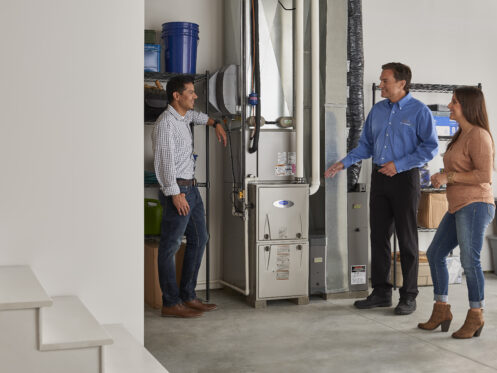Choosing the best gas furnace for your Cheshire, CT home isn’t just about getting the job done; it also entails thinking about how it will affect your comfort, energy efficiency, and overall budget. To help you choose the best gas furnace for your home, we put together a detailed list of 12 key factors that should influence your choice. Every aspect, from the kind of fuel and efficiency to the upfront cost and ductwork compatibility, is crucial in selecting a gas furnace that suits your Cheshire home’s specific heating requirements.
1. Fuel Type and Efficiency
When shopping for a gas furnace, Cheshire residents should pay close attention to the efficiency rating and the kind of fuel it uses. Annual Fuel Utilization Efficiency (AFUE) ratings quantify efficiency, making it easy for homeowners to evaluate the effect a certain furnace will have on their energy bills. Higher ratings usually result in lower energy bills. Two-stage natural gas furnaces provide a balance between energy efficiency, cost, and effective heating. They tend to be a go-to choice for homeowners in Cheshire. For those without access to natural gas, propane gas heating is always a viable option.
2. Local Climate Considerations
Several local climate patterns play a large role in selecting the right gas furnace. The average cold temperature during the winter impacts how small or large of a heater capacity you will need. In regions that experience significant temperature variations, homeowners may benefit from selecting furnaces with adaptable features like two-stage or modulating models for better efficiency. It’s also important to consider how the local climate patterns affect humidity levels since they have a direct impact on interior comfort. In areas that experience lots of dry air, it can be helpful to choose a gas furnace that works in conjunction with a humidification system.
3. Ductwork Compatibility
For the best heating performance, it’s vital to think about the furnace’s compatibility with the home’s ductwork. For easier installation and better efficiency, the furnace must fit properly with the current ducting. Making sure the ducts are compatible with the furnace is essential for avoiding energy waste and maintaining a constant level of comfort in the house. To promote effective and energy-efficient heating, it is important to address this element early on in the selection process so that the new gas furnace can be seamlessly integrated into the heating system.
4. Size and Space
Before purchasing a gas furnace, it is essential to measure the available area to ensure proper installation. For correct installation and trouble-free operation, make sure the furnace fits snugly into the allotted area. The key to a well-functioning furnace that avoids overheating or provides sufficient warmth is to match its size to the available space in the house. The gas furnace will last longer and work more efficiently if the dimensions are carefully considered. Furnaces that use natural gas or propane are, in most cases, around the same size. The heating capacity and efficiency of a furnace, not the fuel type, are the primary factors that dictate its size.
5. Heating Capacity
How much heat a furnace can produce is directly proportional to its capacity, which manufacturers express in British Thermal Units (BTUs). To choose the right furnace capacity, consider the home’s dimensions, insulation, and environment. Energy waste occurs when a furnace is too big, while insufficient heating occurs when a furnace is too small. The average capacity range for domestic gas furnaces is 40,000 BTUs (British Thermal Units) to 100,000 BTUs or more. For the best performance and energy efficiency from a furnace, it’s important to have a professional HVAC expert do a load calculation to identify the home’s unique heating requirements.
6. Noise Level
Choosing a gas furnace that suits individual comfort preferences is key to a quiet living environment; therefore, it’s important to evaluate noise levels. Because they run continuously at full power, single-stage gas furnaces can be fairly noisy. On the other hand, two-stage and modulating furnaces can alter their output according to the home’s specific heating demands, resulting in quieter operation.
7. Air Quality Features
Choosing a gas furnace with air-quality features is critical for a healthy home. Both propane and natural gas furnaces are available with state-of-the-art filtration and purification systems that improve the air quality within the home. Features such as electrostatic filters, ultraviolet lamps, and high-efficiency particulate air (HEPA) filters are common in these types. Choosing a gas furnace with advanced air quality features is especially beneficial for homes where allergy or asthma sufferers reside.
8. Reputation of the Brand
For optimal performance and dependability, it’s important to do brand research before buying a gas furnace. To get a feel for a brand’s credibility, look into its reviews, ratings, and history. Think about things like the lifespan and efficiency of each brand’s products and the technological progress each brand has made.
9. Upfront Costs
Considering the upfront cost of a gas furnace helps homeowners narrow their options and stick to a budget. Even though cheaper options are available, these types tend to compromise on efficiency and features. Take single-stage gas furnaces, for example. They are cheaper than their two-stage alternatives, but they lack energy-saving features. Modulating furnaces tend to be some of the most expensive, but they offer major long-term savings thanks to their increased efficiency.
10. Maintenance Requirements
To ensure homeowners can stay in line with their furnace’s maintenance requirements, they must know what they are before making a purchase. Single-stage furnaces usually come with fewer maintenance needs due to having a smaller number of parts. However, they aren’t nearly as efficient as two-stage systems. Even though two-stage systems have higher maintenance needs, they can save homeowners money on heating bills, fully compensating for the increased maintenance requirements. No matter the type a homeowner chooses, regular heating maintenance is essential to the lifespan and performance of any furnace.
11. Smart Thermostat Compatibility
For better heating and less energy waste, it’s crucial to have a gas furnace that works with smart thermostats. With the help of these devices, homeowners can optimize their heating performance with remote temperature control, customizable scheduling, and adaptive learning.
12. Zoning Options
To maximize heating efficiency and comfort, consider installing a furnace that is compatible with zoned heating. This form of heating allows users to independently manage the temperature in various zones throughout the home. Zoned heating is particularly beneficial in larger homes when paired with occupancy sensors because it can minimize energy waste. It does this by only heating the occupied areas. In unoccupied areas, it lowers the temperature to the most energy-efficient temperature possible.
F.F. Hitchcock Plumbing, Heating & Cooling is here to help you select the right gas furnace for your home. We also help homeowners with all of their plumbing and energy conservation needs. Give us a call today to learn more about the important factors to consider when shopping for a gas furnace.







